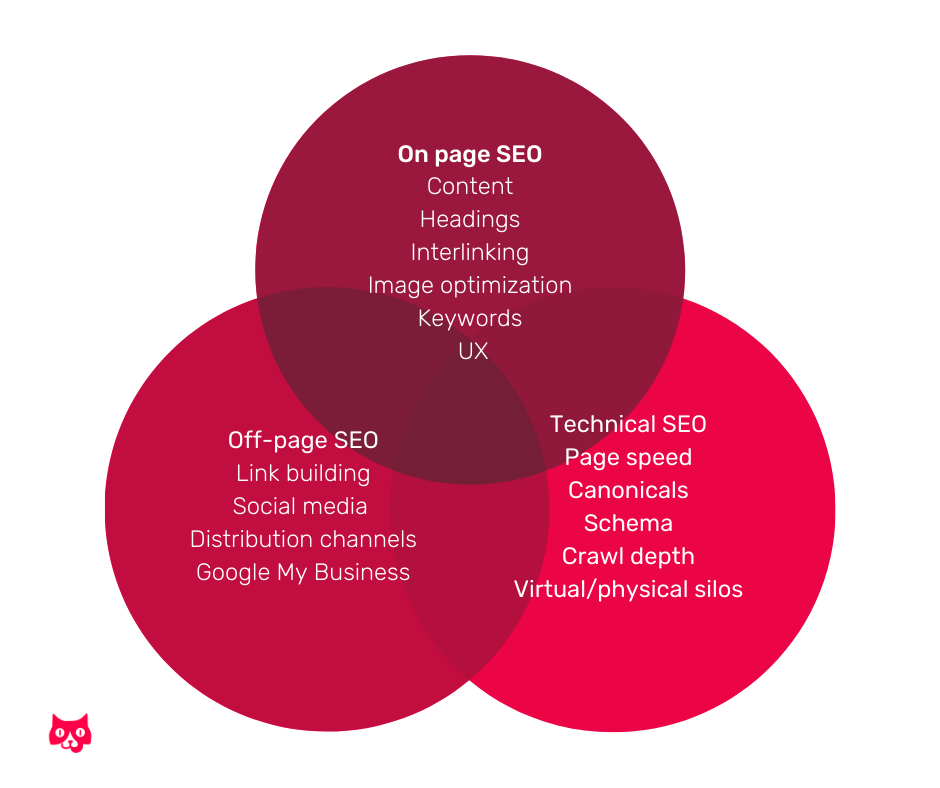Link building is one of the most difficult parts of SEO.
But it’s not just about getting as many links back to your domain as possible.
Just like on-page SEO, there’s an art to it.
You have to know which pages will work best for your niche, and decide which of your pages to link to.
In today’s interview, I’m speaking with Italo Viale, co-founder of Outreach Humans, about the secrets you may not know about link building strategies.
Off-page SEO trifecta
Search engine optimization is a beautiful combination of three pillars:
- On-page
- Off-page
- Technical
Some SEO providers will focus on one more than the other. For instance, here at Flying Cat Marketing, we focus on on-page SEO with a bit of off-page.
Others will focus only on technical SEO or strictly link building. That’s exactly what my guest, Italo Viale, offers at his SEO agency. Outreach Humans specializes on link building for SaaS companies, and today we’re going to learn about how to launch a link building campaign.

All three pillars are important in SEO.
Link building, the main component of off-page SEO, is a cornerstone SEO strategy. It is one of Google’s overt ranking factors – links on other websites pointing to yours is a signal to Google saying “hey, this website knows what it’s talking about”.
It’s possible to rank your content without link building, but it’s much harder, and nearly impossible if you’re trying to rank for difficult keywords.
And frankly, link building is the biggest headache in SEO.

About PageRank
PageRank is one of Google’s many algorithm factors used to decided where pages rank in the search engine results page (SERP). According to Google, PageRank is:
PageRank works by counting the number and quality of links to a page to determine a rough estimate of how important the website is. The underlying assumption is that more important websites are likely to receive more links from other websites
It’s not quite as simple as getting more links, though.
That worked back in the day, when people would create a bunch of fake websites and link back to the money page.
Today, links need to come from websites that already have established authority in your niche. Relevance is more important than domain authority.
For example, if your page is about Airbnb property management, you’ll do better getting links from a real estate website than from the New York Times.
Alternatively, quality is more important than quantity.
Meaning, 10 links from high domain authority, super-relevant websites are better than 100 links from totally random websites.
This factor works on a page level, not a domain level. That means you should work to get a few links to your home page, sure, but you should be focusing your link building efforts on specific pages (content—blog posts).
Create a link scoring system
Italo suggests creating a link scoring system to know what to link to.
That means you need to start with a documented content strategy. Let’s say you have 10 posts.
You’ll know which posts are bottom of the funnel (convert faster but receive less traffic) and which are top of the funnel (slower to convert, but higher traffic volume).
You decide how many links will each piece need to make it to the top 3.
Based on that, you can see which are your quick wins, which are your mid-term wins, and which are your long-term wins.
Choosing your anchor text
When you figure out which pieces you need links to, you need to pay attention to the anchor text linking to them.
Anchor text is the clickable text for hyperlinks that looks like this.
Where possible, the anchor text should be exactly the keyword you’re trying to rank for. Meaning if you want to rank a post for best key management technology, that’s the text you should use in the anchor.
On the other hand, you should prioritize natural placement over getting the exact keyword. Sometimes using the keyword just sounds awkward. Google is smart enough that if you use a variety of semantics, it will still help you rank for your target keyword.
For example, in the above example, you could use an anchor text like “technology for managing keys” and it would still work.
Backlinks vs. referring domains
Backlinks aren’t the same as referring domains.
Referring domains are the actual domain that link to you. So if you have 9 links from one website, even if across multiple pages, you still get only 1 referring domain.
Backlinks are the links themselves.
You should aim to have a wide portfolio of referring domains. However, remember that the quality (authority and relevance to your niche) is more important than quantity.
What’s your greatest struggle with link building? Drop it in the comments below!
